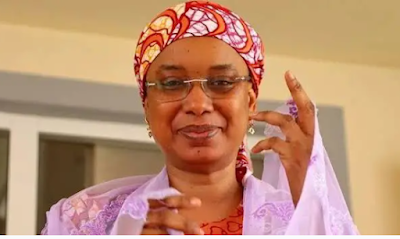A federal high court in Abuja has struck out the suit filed by Aisha ‘Binani’ Dahiru against the prosecution of Hudu Yunusa-Ari by the Independent National Electoral Commission (INEC).
Binani was the candidate of the All Progressives Congress (APC) in the Adamawa governorship election.
Binani had sought a court order restraining INEC from prosecuting Yunusa-Ari, suspended Adamawa resident electoral commissioner (REC), for declaring her as the winner of the supplementary governorship poll, pending the hearing and determination of her petition before the Adamawa election tribunal.
Yunusa-Ari had declared Binani as winner of the supplementary poll when the collation of the results was yet to be completed.
INEC declared the announcement null and void and summoned the REC to its headquarters in Abuja.
Subsequently, INEC wrote to the police to prosecute Yunusa-Ari over the electoral infraction.
On April 20, ex-President Muhammadu Buhari approved the suspension of the Adamawa REC pending the completion of investigation by the police.
On July 6, INEC filed a six-count charge against Yunusa-Ari before a high court in Yola.
However, Binani through her counsel, Michael Aondoaka, moved an ex-parte motion to stop Yunusa-Ari’s prosecution.
Aondoaka had argued that until the election petition tribunal decides the fate of Binani in accordance with section 149 of the electoral act, 2022, the prosecution of Yunusa-Ari cannot be said to be valid.
He said the decision of INEC to file an action against any person in connection with Binani’s declaration as winner of the supplementary poll in Adamawa, would affect the case at the tribunal.
On July 10, a federal high court in Abuja restrained INEC from prosecuting Yunusa-Ari.
Donatus Okorowo, the presiding judge, ordered the parties to maintain status quo ante bellum, pending the hearing and determination of the matter.
COURT REFUSED TO EXTEND INTERIM ORDER
At the resumed court session on July 18, Rotimi Jacobs, INEC’s lawyer, informed the court that the applicant had not served the respondents with the July 10 order.
Jacobs, who also contested the competence and jurisdiction of the court to entertain the matter in a counter affidavit to the motion, said the lifespan of the interim order expired on July 18.
However, Aondoaka, argued that the interim order cannot expire since the defendants had not shown cause as directed by the court.
The judge refused to extend the interim order previously granted and adjourned the matter to July 24.
Upon resumed hearing, Chiesonu Okpoko, who held the brief for Aondoaka, said the suspended REC is critical to his client’s case at the tribunal.
The lawyer argued that the star witness was being harassed and prevented from giving evidence before the tribunal and that prosecuting Yunusa-Ari would pose a likelihood of bias in the tribunal’s decision.
Responding, Adebisi Adeniyi, who held brief for Jacobs, disagreed with Okpoko’s submission.
Adeniyi argued that the charge preferred against the suspended REC was bailable which would allow him to give his testimony mbefore the tribunal after he has been granted bail.
The lawyer said Binani had not presented any evidence before the court to show that Yunusa-Ari was listed as a witness in her petition.
He also argued that the applicant had also failed to show evidence that the suspended REC had either been invited, arrested or charged.








